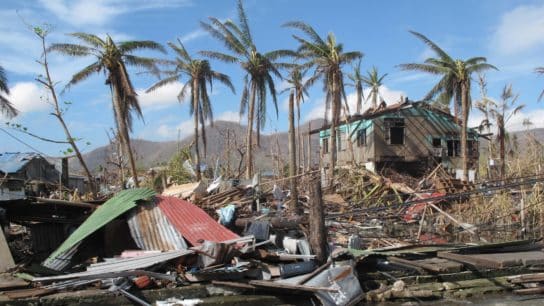This weekly round-up brings you key climate news from the past seven days, including the outcome of negotiations for a global plastic treaty in South Korea and the delay of a controversial anti-deforestation law in the EU.
—
1. Negotiators Fail to Agree on Global Plastic Treaty As Talks Postponed to Next Year
The week-long meeting in Busan, South Korea, was the last of five scheduled Intergovernmental Negotiating Committee (INC) meetings intended to yield a legally binding instrument to tackle the rampant plastic crisis. But standing disagreements on the basic scope of the treaty meant a decision could not be reached.
“It is clear there is persisting divergence in critical areas and more time is needed for these areas to be addressed,” UNEP Executive Director Inger Andersen said on Sunday as she adjourned negotiations to a later unspecified date.
“INC-5.2” will look at resolving many outstanding issues outlined in the final draft text released on Sunday. These include capping plastic production, managing plastic products and hazardous chemicals, and financing to support the implementation of the treaty in developing countries.
2. EU Negotiators Delay Deforestation Ban, Discard Proposed Changes
EU negotiators on Tuesday voted to delay the bloc’s controversial deforestation ban by one year but rejected changes to the regulation.
The move follows a proposal by the European Commission in October to delay the legislation until December 30, 2025, in response to mounting pressure from some EU and non-EU countries, global business partners and industry. Many of them were complaining about a lack of preparedness to comply with the new strict requirements.
Negotiators, however, rejected a Commission’s proposal to water down the regulation by implementing a new “no risk” category of countries, mostly EU members, with vastly reduced checks.
3. North and South America Endured ‘Exceptional’ Wildfire Season in 2024
2024 was a “devastating” year for large parts of North and South America, which saw above-average wildfire activity exacerbated by severe drought conditions.
The Pantanal wetlands, the Amazon, Canada and the western US experienced “particularly intense wildfires” this year, the EU Copernicus Atmosphere Monitoring Service (CAMS) said on Thursday. The agency, which monitors global wildfire emissions, said exceptional drought conditions affecting the Americas have increased the likelihood of the occurrence of large wildfires.
The Amazon wildfire season started early this year, with Brazil and Venezuela breaking the record for the highest carbon emissions for February.
The Pantanal, home to the world’s largest tropical wetland area, had a catastrophic wildfire season, with wildfire activity up 980% from last year. Wildfires ravaged nearly 1.5 million hectares of the region’s 20 million hectares.
4. Environmental Groups Urge EPA to Monitor Microplastics in Water
More than 170 top environmental groups have signed a petition urging the US Environmental Protection Agency to begin monitoring microplastics in drinking water, reflecting a growing recognition of the pervasive presence of microplastics in the environment and the escalating concerns regarding their potential risks to human health.
The petition, submitted last month by Food & Water Watch, requests the EPA to begin monitoring microplastics as an emerging pollutant under the Safe Drinking Water Act starting from 2026 to protect public health. It was co-signed by 175 groups including Beyond Plastics, Center for Biological Diversity, Center for International Environmental Law, Friends of the Earth and Greenpeace.
Microplastics, tiny plastic particles resulting from the degradation of larger plastics, have been found pretty much everywhere – inside marine creatures and in mammal feces, in food and bottled water, and even in human blood. Because this is still a relatively new research field, scientists cannot yet fully estimate the long-lasting impact of these particles on animals and humans.














